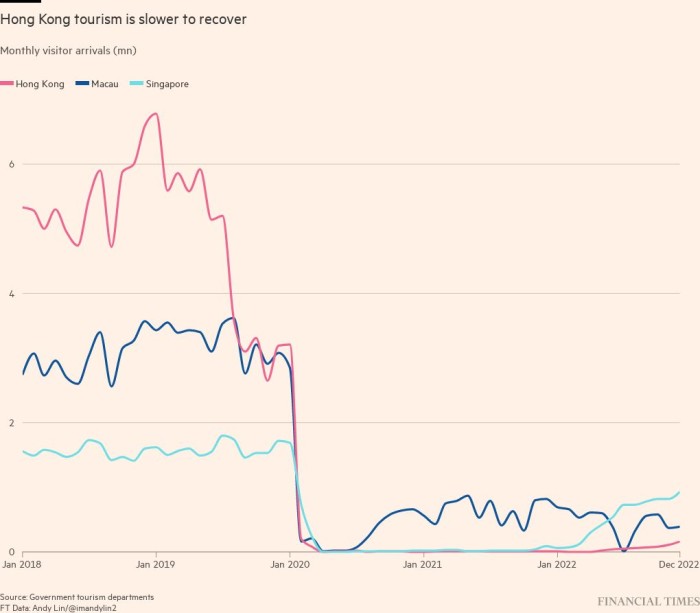[ad_1]
Steve Dressler, the owner of Hong Kong-based relocation services company Trade Winds, has had a front-row seat to an exodus over the past three years as pandemic restrictions sent residents fleeing in droves. Business was so hectic that departing families launched “bidding wars” for shipping containers, he said.
Hong Kong has finally lifted the tough Covid-19 controls that sent the economy into recession and undermined its status as Asia’s financial hub. Dressler has “sent [the] whole team on holiday” — an illustration of how people may not be leaving, but they are not returning yet, either.
“There are no families taking two-year leases in Stanley and MacDonnell Road,” he said, referring to wealthy residential districts. “It’s singles taking serviced apartments in Wan Chai and I have no business.”
There has been a general exhalation of relief across the city in the wake of the reopening. After years of imposing policies that pushed residents out, some to regional rival Singapore, Hong Kong’s government is now striving to woo talent back with incentives intended to show that “Asia’s world city”, as it advertises itself, is back in business.
The government has pledged funds for international businesses to set up operations in the territory, promised new visas for graduates from top global universities and last week announced that it would give away as many as 500,000 free airline tickets to encourage tourism.
“This is probably the world’s biggest welcome ever,” John Lee, the city’s current leader and former top police officer, said at a splashy promotional event last week to launch a marketing campaign, Hello Hong Kong, that included synchronised dancers in service-sector uniforms.

The government faces a challenge to lure workers back and reset a woeful economic climate. Gross domestic product shrank 4.2 per cent year on year in the fourth quarter of 2022, marking a fourth consecutive quarter of contraction and a second full-year recession during the pandemic.
Hong Kong only began in September to unwind its quarantine restrictions, which at one point mandated three weeks of hotel stay for arrivals. The city has since scrapped nearly all its curbs, following Beijing’s example after the Chinese government abruptly dropped its restrictive zero-Covid strategy late last year. A mask mandate remains in place, however, enforced with a HK$5,000 (US$640) penalty.
But the U-turn came too late for many. More than 140,000 members of Hong Kong’s workforce left over the past two years, according to government figures, while almost 145,000 have taken advantage of the British National (Overseas) visa programme, with a pathway to citizenship to resettle in the UK.
In 2021, the number of US corporates with regional headquarters in Hong Kong fell to an 18-year low. A year later, there were more mainland Chinese companies with headquarters in the city than US groups for the first time in more than 30 years.
The exodus was also motivated by China’s political crackdown on the territory following pro-democracy protests in 2019 and the imposition of tough national security legislation the following year. Forty-seven pro-democracy activists went on trial this week in the largest case under the law.
Inflows of tourists and returning residents have also been slow. Hong Kong recorded just a third of the number of visitors as neighbouring gambling hub Macau during last month’s lunar new year holiday, usually a peak for tourism.
The Federation of Hong Kong Hotel Owners said average occupancy was about 60 per cent, compared with the usual 90 per cent, over the period. Ovolo Hotel Group, which runs four hotels in Hong Kong, said their premises were just 35 per cent full.
“Many of us probably wished to see the full rebound yesterday. Realistically, it will take time,” said Girish Jhunjhnuwala, Ovolo chief executive. “I think it has to do with Hong Kong’s approach to removing Covid restrictions — it’s slow, one by one and people abroad really struggled to follow.”
Still, economists forecast Hong Kong will rebound to 4 per cent growth in 2023, exceeding Singapore, which loosened restrictions earlier, as business activity recovers.
Many believe the west is not the main audience for the city’s charm offensive. A veteran Hong Kong real estate magnate said the government had been encouraging local business to focus on deals with south-east Asia as well as the Middle East.
“This is in line with [Chinese president] Xi Jinping’s recent travels,” the person said, referring to Xi’s visit to Saudi Arabia in December. Hong Kong’s Lee is leading a business delegation this week to the United Arab Emirates and Saudi Arabia, where he is keen to entice Saudi Aramco to list in the Asian financial hub, he has said.
Danny Kwan, director at Pinpoint Asia, a financial services recruiter, said that while Hong Kong faced stiff competition from Singapore and had a “very big” talent shortage, it remained a competitive destination.
“Hong Kong is easier and cheaper . . . and for mainland Chinese to come to Hong Kong it’s easier to get a visa than in Singapore,” Kwan said.
But Johannes Hack, president of Hong Kong’s German Chamber of Commerce, who sits on a new task force to promote the city, said a “long-haul” effort to change business perceptions would have to go beyond plane ticket giveaways.
“If you have relocated corporate functions to another place, half a year later you are probably not going to reverse the whole thing,” he said. “People who have moved to Singapore with their teen kids, there is no way they are going to do that again . . . They are not going to come back.”
[ad_2]
Source link


